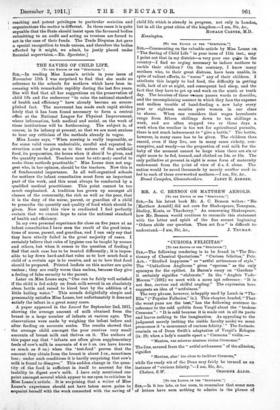"CURIOSA FELICITAS."
[To THE EDITOR Or THE " SPECTATOR."]
Sag,—The following rendering is to be found in "The Dic- tionary of Classical Quotations." "Carlow. felicitas," Petr. Arb. : "Studied happiness" or "artful artlessness of style." The "Catholicon Anglicum " gives " operosa " as the only synonym for the epithet. In Bacon's essay on "Gardens " it certainly signifies " elaborate." In the " Angleis Vade-
• Mecum " (1681) we meet with a more apt reference : "It is. not fine, curious and skilful angling." The expression here suggests an idea of "artfulness." The very phrase, however, is happily used by Lamb in ‘1 The - Elia " ("Popular Fallacies," ix.). This chapter, headed," That the worst puns are the beet," has the following sentence ins reference to the cold quibble from Vergil about the " brokena Cremona ": "It is cold because it is made out in all its parts- and leaves nothing to the imagination. As appealing to the judgment merely (setting the risible faculty aside) we must pronounce it ' a monument of curious felicity.' " The footnote reminds us of Dean Swift's adaptation of Vergil's Eclogue (ix. 28) when a lady's mantle upset a " Cremona " violin :—
" Mantua, vae miserae nimium vicina Cremonae."
The line, severed from the " artful artlessness " of the allusion, signifies " Mantua, alas! too close to luckless Cremona,"
while the ready wit of the Dean may fairly be termed as an instance of " curious felicity."—I am, Sir, &c.,


































































 Previous page
Previous page